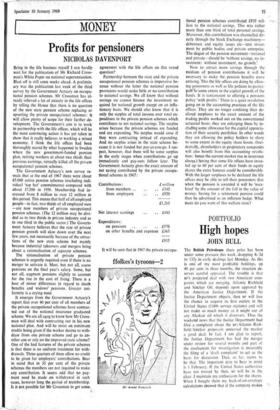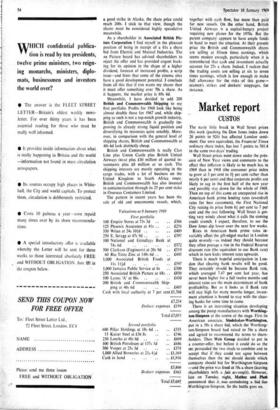High hopes
PORTFOLIO JOHN BULL
The British Petroleum share price has been under some pressure this week, dropping 4s 3d to 137s in early dealings last Monday. As this is one of my most profitable holdings, up 40 per cent in three months, the situation de- serves careful appraisal. The trouble is that BP'S projected deal with two American com- panies which are merging, Atlantic Richfield and Sinclair Oil, depends upon approval by the American Justice Department. If the Justice Department objects, then BP will lose the chance to acquire its first outlets in the United States (5,000 service stations) and will not make so much money as it might out of any Alaskan oil which it discovers. Thus the weekend news that the Justice Department had filed a complaint about the BP/ Atlantic Rich- field/Sinclair proposals unnerved the market a good deal. In fact, I am glad to report, the Justice Department has had the merger under review for several months and part of the mechanism for investigation is invariably the filing of a 'draft complaint' to act as the basis for discussion. That, so far, seems to be that. The important date to bear in mind is 1 February. If the United States authorities have not moved by then, BP will be in the clear. I maintain my enthusiasm for the shares. When I bought them my back-of-an-envelope calculations showed that if the company makes a good strike in Alaska, the share price could reach 200s. I stick to that view, though the shares must be considered highly speculative meanwhile.
As a shareholder in Associated British Pic- ture Corporation I find myself in the pleasant position of being in receipt of a 61s a share bid from Electric and Musical Industries. The AB Picture board has advised shareholders to reject the offer and has provided cogent back- ing for its opinion in the shape of a higher dividend, forecast of increased profits, a scrip issue—and hints that some of the cinema sites have a good development potential. I conclude from all this that if EMI wants my shares then it must offer something over 70s a share. As it happens, the market price is 69s 6d.
Meanwhile, I have decided to add 200 British and Commonwealth Shipping to my first portfolio. Profits for 1968 look like being almost double those for 1967 and, while ship- ping as such is not a top-notch growth industry, British and Commonwealth is gradually im- proving its already strong liquid position and diversifying its resources quite sensibly. More- over, in comparison with the general level of shipping shares, British and Commonwealth at 40s 6d look distinctly cheap.
British and Commonwealth is really Clan Line plus Union Castle plus British United Airways (BuA) plus £30 million of quoted in- vestments plus £8 million or so cash. The shipping interests are mostly operating in the cargo trades, with a lot of business on the United Kingdom to South Africa route. British and Commonwealth has also invested in containerisation through its 25 per cent stake in Overseas Containers Limited.
The pattern in recent years has been the sale of old and uneconomic vessels, which,
Valuations at 8 January 1969 First portfolio
100 Empire Stores at 73s 3d .. £366 125 Phoenix Assurance at 4Is £256 330 Witan at 24s 104d .. £409 250 E. Scragg at 47s 9d .. • • £597 100 National and Grindlays Bank at 74s 6d £372 500 Clarkson (Engineers) at 20s 9d £519 60 Rio Tinto Zinc at 148s 6d .. £445 1,000 Associated British Foods at lls 111d £597 1,000 Jamaica Public Service at 6s £300 250 Associated British Picture at 68s £850 100 Lyons 'A' at 86s £430 200 British and Commonwealth Ship- ping at 40s 6d £405 Cash with local authority at 7 per cent £1,708 £7,254
Deduct: expenses £199
Total £7,055
Second portfolio
600 Pillar Holdings at 18s 6d ..
15 Kaiser Steel at £36 8s .. 250 Lonrho at 48s 9d 100 British Petroleum at 137s 3d 300 Vosper at 25s 3d .
1,000 Allied Breweries at 23s 45d Cash in hand .. £5,860
Deduct: expenses £163
Total £5,697, .. £555 .. £546 .. £609 .. £686 .. £379 .. £1,169 .. £1,916
together with cash flow, has more than paid for new vessels. On the other hand, British United Airways is a capital-hungry project requiring new planes for the 1970s. But the parent company appears to have ample funds in hand to meet the situation. At their preseht price the British and Commonwealth shares are selling at fifteen times earnings, which seems modest enough, particularly when it is remembered that cash and investment actually account for 25s a share. Indeed, I reckon that the trading assets are selling at six to seven times earnings, which is low enough to make lull allowance for the risks • of this game— seamen's strikes and dockers' stoppages, for instance.



































 Previous page
Previous page